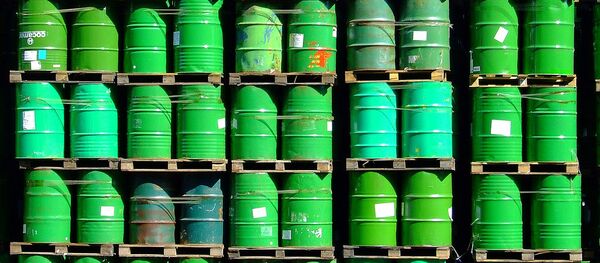According to Bloomberg, this year Saud Arabia sold its first bonds since 2007.
The kingdom may raise a total of $27 billion by the end of the year, Dmitry Postolenko, a portfolio manager for asset management company Kapital, pointed out.
Saudi Arabia is in need of money after oil prices halved, the analyst said.
"In 2015 the country needs oil prices of around $105 per barrel to balance its budget. The country relies on oil sales for 90 percent of its budget revenue," Postolenko explained as quoted by Gazeta.ru.
Tim Callen, who led an International Monetary Fund (IMF) mission to Saudi Arabia in May, said in 2015 "the decline in oil prices is resulting in substantially lower export and fiscal revenues."
"Government spending in 2015 is expected to remain strong, partly due to a number of one-off factors, while oil revenues have declined. As a result, IMF staff projects that the government will run a fiscal deficit of around 20% of GDP [nearly $140 billion] in 2015," Callen was quoted as saying by International Business Time.
Until recently, Saudi Arabia compensated the loss with money from the government reserves. Since August 2014, the country withdrew $65 billion from its general monetary reserve which currently is around $672 billion.
Bond selling would help slow down the decline of the country’s monetary reserve, analyst at Promsvyazbank Alexander Polyudov explained.
The point is that the current fiscal problems of Saudi Arabia resulted from its own policy in the oil market. The country has maintained an oversupply of oil as well as low prices to preserve its market share and obstruct the production of shale oil in the US.
Nevertheless, Grigory Kosach, an expert at the Institute for the Middle East of the Russian Academy of Sciences, opposes a theory that Saudi Arabia in cooperation with the US deliberately dropped oil prices to damage the Russian economy.
He also noted that according to Saudi officials the country plans to stick to its strategy in the future.
Despite the sharp decrease in oil revenue, Saudi Arabia would not cut down government spending and continue to unveil money for healthcare and educational programs, the analyst concluded.
"The country will overcome its budget problems. I’m absolutely sure that stability will be preserved in the near future," he added.
Tim Callen also said the effect of the oil prices decline on the rest of the economy has so far been limited. The IMF projects growth to slow to 2.7 percent in 2016, and over the medium-term, growth is expected to be around 3 percent.
To achieve this goal the country will have to maintain a high level of government expenditures, including taking money from the reserve. Despite the fact that $672 billion seems to be enough for now, the experience of other countries shows that reserves easily dry out, especially without any austerity measures. In the current situation, Saudi Arabia is likely to continue selling bonds, Gazeta.ru pointed out.




